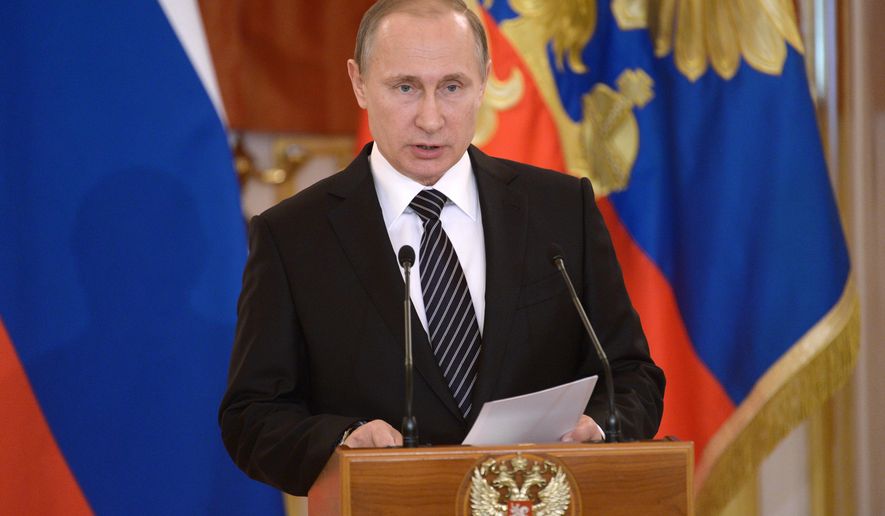ANALYSIS/OPINION
Vladimir Putin stunned the West with his announcement this week that Russia was removing the bulk of its expeditionary force fighting in support of Syrian President Bashar Assad in that country’s civil war. However, if you look at the development from the perspective of Moscow’s national interest, the removal of Russia’s air assets makes perfect sense. Mr. Putin’s decision is perfectly aligned with Kremlin’s geopolitical goal of regaining influence on the world stage.
In spite of the propaganda line pushed by Moscow — that Russia entered the conflict to destroy the Islamic State and prevent it from infiltrating the Caucasus and Russia’s Islamic population — that was never the main agenda. The goal was to shore up the Assad regime, a longtime Soviet and Russian ally, and preserve Russian basing options in the Middle East, an area critical to Moscow’s historical sphere of influence. Once the Assad regime was stabilized, Russian forces, and the costs associated with the deployment, were no longer needed.
There were no delusions about nation-building. There were no concerns about civilian casualties. There was no thought given to the morality of collateral damage. There was only concern for Russia’s national interest, pure and simple.
Russia cannot afford a long-term, significant deployment in the Middle East, and the Kremlin decided Russia didn’t have to.
Look at what Russia accomplished in five months: The United States is no longer the dominant figure in the region, even after spending trillions of dollars and losing thousands of soldiers and tens of thousands more wounded.
The axis of Russia, Iran and Syria is now the hegemon in the region. Russia has shown it can deploy a large force beyond its borders and operate it effectively. This power-projection capability restores its status as a military superpower, even though Russian forces were for the most part operating Soviet equipment with low-tech weapons in Syria.
Moreover, the Russian air force was able to test out new weapon systems and try out new tactics to go along with them. The entire Syrian episode was a five-month infomercial for Russian arms manufacturers, who are critical to Moscow’s drive for foreign currency to rebuild its coffers and protect Russian firms from Western sanctions that prevent them from rolling over their debts in world capital markets. The Kremlin launched cruise missiles from the Caspian Sea and the Mediterranean. They deployed S-400 anti-aircraft missile systems to threaten NATO aircraft and prevent a no-fly zone from being established. They flew strikes against targets in Syria using long-range bombers launched from Russian territory. NATO generals were quite impressed and said so publicly.
When exerting its national power, the Russian government operates with all the tools at its disposal. The state media apparatus shifted into overdrive to dictate the narrative in the Western and global press. This effort was also extremely effective.
The withdrawal also allows the Kremlin to avoid the perception at home that Russia was getting bogged down in another war. Mr. Putin is keen to maintain his popularity with voters and head off any excuse for social unrest. Now Russians have another reason to feel proud and back their leader, and they will continue to do so in droves. This is the key to Mr. Putin’s survival, despite the economic hardship ordinary Russians are experiencing. Like Donald Trump, Mr. Putin has an uncanny ability to stroke popular insecurities where and when they need it most.
All in all, the Russian Syrian adventure was a masterful example of geopolitical savvy. With a few dozen old aircraft, some old, inexpensive ordinance that indiscriminately killed on the ground, and chutzpah, Mr. Putin ousted his nemesis, the United States, from an area critical to the Russian national interest and gained a footprint in the Middle East at the same time.
The Kremlin was quick to remind friends and foes Thursday that it can return forces to the region within hours. I do not doubt that for a second.
⦁ L. Todd Wood, a former U.S. military helicopter pilot and Wall Street debt trader, is a contributor to Fox Business, the National Review and many other publications. He can be reached through his website, LToddWood.com.




Please read our comment policy before commenting.